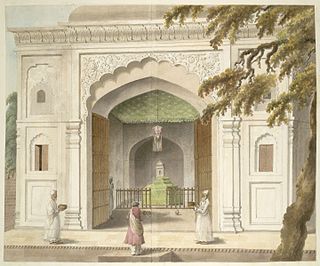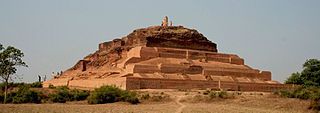
Rohilkhand is a region in the northwestern part of Uttar Pradesh, India, that is centered on the Bareilly and Moradabad divisions. It is part of the upper Ganges Plain, and is named after the Rohilla. The region was called Madhyadesh and Panchala in the Sanskrit epics Mahabharata and Ramayana. During the colonial era in India, the region was governed by the Royal House of Rampur.

Ahmed Raza Khan Barelvi, known reverentially as A'la Hazrat, was an Indian Islamic scholar and poet who is considered as the founder of the Barelvi movement.

Rohillas are a community of Pashtun heritage, historically found in Rohilkhand, a region in the state of Uttar Pradesh, India. It forms the largest Pashtun diaspora community in India, and has given its name to the Rohilkhand region. The Rohilla military chiefs settled in this region of northern India in the 1720s, the first of whom was Ali Mohammed Khan.
The term Nawab of Pataudi refers to the lineage of rulers of the former princely Pataudi State in Northern India. Pataudi was established in 1804 by the British East India Company, when Faiz Talab Khan, an Afghan Muslim Pashtun of the Barech tribe, who was made the first Nawab, aided them in their battle against the Maratha Empire, during the Second Anglo-Maratha War. The family traces their origin to 16th century India, when their ancestors immigrated from present-day Afghanistan to India during the Lodi dynasty.

Nawab Mohammad Iftikhar Ali Khan Pataudi, sometimes I. A. K. Pataudi, was an Indian prince and cricket player.

The Bareilly district belongs to the state Uttar Pradesh in northern India. Its capital is Bareilly city and it is divided in six administrative division or tehsils: Aonla, Baheri, Bareilly city, Faridpur, Mirganj, and Nawabganj. The Bareilly district is a part of the Bareilly Division and occupies an area of 4120 km2 with a population of 4,448,359 people according to the census of 2011.
Khan is an ancient Indo-European surname and in the variant of 'Khan' of Mongolic origin, used as a title in various global regions, and today most commonly found in parts of India, Pakistan, Afghanistan, Bangladesh, Uzbekistan and Iran.

Hafiz Rahmat Khan was the Regent of Rohilkhand in North India, from 1749 to 1774. He was a Pashtun by background, ruling over Rohillas. Hafiz Rahmat Khan had served honorably throughout the reign of three Mughal Emperors: Ahmad Shah Bahadur, Alamgir II and Shah Alam II. He was also a mentor of Prince Mirza Jawan Bakht.

Rampur State was a 15 gun-salute princely state of British India. It came into existence on 7 October 1774 as a result of a treaty with Oudh. Following independence in 1947, Rampur State and other princely states of the area, such as Benares and Tehri Garhwal were merged into the United Provinces. Rampur state had its capital in Rampur city and its total area was 945 sq miles. Rampur state was founded by Ali Mohammad Khan's younger son Faizullah Khan.

Nawab Mohammad Mansoor Ali Khan Pataudi was an Indian cricketer and a former captain of the Indian cricket team.

According to the epic Mahābhārata, Bareilly region (Panchala) is said to be the birthplace of Draupadi, who was also referred to as 'Panchali' by Kṛṣṇā. When Yudhishthira becomes the king of Hastinapura at the end of the Mahābhārata, Draupadi becomes his queen. The folklore says that Gautama Buddha had once visited the ancient fortress city of Ahicchattra in Bareilly. The Jain Tirthankara Parshva is said to have attained Kaivalya at Ahichhatra.

Bārakzai is the name of a Pashtun tribe from present-day Kandahar, Afghanistan. '"Barakzai" is a common name among the Pashtuns and it means "son of Barak" in Pashto. According to the Encyclopædia Iranica, "In the detailed Pashtun genealogies there are no fewer than seven instances of the ethnic name Bārakzī, at very different levels of tribal segmentation. Six of them designate simple lineages within six different tribes located in the Solaymān mountains or adjacent lands... The seventh instance, on the other hand, designates one of the most important Pashtun tribes in numbers and historic role, part of the Zīrak branch of the Dorrānay confederation.
The Tarikh i Yamini, or Kitab i Yamini, written in Arabic in an embellished, flowery rhetorical rhymed prose, is a history of the reigns of Sebuktigin and Mahmud.
The Pataudi family is an Indian royal (Nawab) family belonging to the former princely state of Pataudi. Later this family got involved in show business and primarily working in India's Hindi film industry, commonly known as 'Bollywood'.

The Kingdom of Rohilkhand was a late modern Indian kingdom under nominal Mughal suzerainty, that rose under the declining Mughal Empire in 1721 and continued to exist until 1774 when it was defeated by Oudh. The British transformed its significantly reduced borders into the princely state of Rampur. Nawab Ali Mohammed Khan became the first Nawab of Rohilkhand, having been previously elected as overlord by various Afghan chiefs at the age of fourteen. He would carve out the future kingdom from the collapsing Mughal Empire and go on to the found the Rohilla dynasty. The crown would go on being held by the Rohillas until the kingdom came to an end in 1774, and thereafter the same dynasty would rule over Rampur.

The Rohilla dynasty was a dynasty that ruled over much of North-West Uttar Pradesh in the form of Rohilkhand and later until 1947, the Princely state of Rampur. At the height of their power the dynasty ruled over the Kingdom of Rohilkhand and held suzairnty over the Kingdom of Kumaon and Kingdom of Garhwhal.
Siddiqui are a Muslim community, found mainly in India, Pakistan, and Bangladesh, and in communities in Saudi Arabia, the Middle East and North Africa.
Pathans in India or simply known as Pathans are citizens or residents of India who are of ethnic Pashtun ancestry. "Pathan" is the local Hindavi term for an individual who belongs to the Pashtun ethnic group, or descends from it. The Pathans originate from the regions of Eastern Afghanistan and Northwestern Pakistan, ethnolinguistically known as Pashtunistan.










